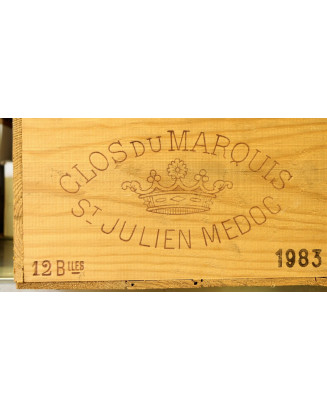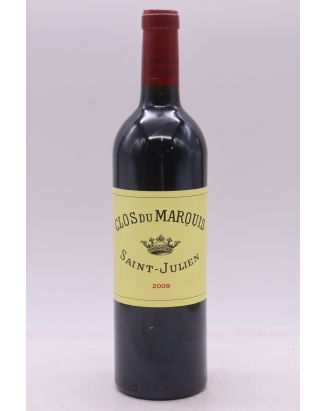






Clos du Marquis was created in 1902, drawing its roots from the "Petit Clos" that once adjoined the Château de Léoville, the historic residence of the Marquis de Las Cases. It is in this context that Clos du Marquis was born, in a vineyard separated from the plots of Château Léoville Las Cases. At the time, the objective was to take advantage of distinct terroirs, offering a quality alternative to the great growths while remaining close to the richness and structure of the wines of Saint-Julien.
With roots anchored in the Delon domains, a historic family of the Médoc, Clos du Marquis is the fruit of viticultural expertise passed down through generations. Initially seen as a second wine, it quickly gained autonomy and a unique reputation. Thanks to the care provided by the Léoville Las Cases technical team, Clos du Marquis has reached a quality level comparable to Third Classified Growths, even rivalling the great names of the region.
Today, this cuvée is recognised for its balance, ageing potential, and sophisticated style. In tribute to the women who have contributed to the history of the estate, a new cuvée, La Petite Marquise, has been created from young vines, adding a touch of refinement and modernity to the range.
Located in the Saint-Julien appellation, the Clos du Marquis vineyard enjoys a unique and advantageous location. It extends over approximately 45 hectares, only 500 metres west of the Enclos of Léoville Las Cases. This vineyard is planted on quaternary gravels, ancient and fine soils that contribute greatly to the quality and typicity of the wines produced here. At 20 metres above sea level, on the Saint-Julien plateau, the soils are composed of humic podzols on a base of sandy-clay gravels, promoting natural drainage and greater homogeneity.
The historical forestry of the region confers an important surface organic matter to the vineyard, adding a unique complexity to its wines. In terms of composition, the vineyard is planted with 67% Cabernet Sauvignon, 32% Merlot and 1% Cabernet Franc, thus giving Clos du Marquis its characteristic balance and structure. The combination of these grape varieties, grown on plots with more pronounced water constraints, creates wines of great complexity, with exceptional ageing potential.
The harvests are often later than for the neighbouring vineyards, due to the slower maturation of the grapes on this specific plot. Unlike the Enclos, which benefits from the heat reflected by the Gironde, Clos du Marquis evolves in a slightly cooler environment, contributing to a more gradual and controlled ripening of the grapes.
The winemaking of Clos du Marquis is based on a rigorous and precise approach, aimed at revealing the typicity of its terroir. Manual harvests allow a meticulous selection of the berries, ensuring consistent quality across each vintage. Once harvested, the grapes are carefully destemmed before undergoing temperature-controlled fermentation, allowing the preservation of aromas and the extraction of a beautiful tannic structure.
The vinifications are carried out in thermoregulated stainless steel vats, allowing optimal control of the fermentation. After this crucial step, the wine is transferred to oak barrels, a portion of which are new, to ensure perfect harmony between the wood and the wine. This method contributes to refining the tannins and adding subtle complexity, while maintaining the wine's balance and elegance.
The Léoville Las Cases technical team closely supervises each stage of the winemaking process, combining tradition and innovation to preserve the authenticity of Clos du Marquis. Thanks to this commitment, the wine expresses all the richness and balance of Saint-Julien, with a velvety texture and a keeping ability that delights the lovers of great Bordeaux wines.
Clos du Marquis
The first wine of the Saint-Julien appellation, Clos du Marquis is renowned for its elegant and structured character. Its wines display great aromatic finesse, marked by ripe black fruit aromas, cedar wood notes and a touch of liquorice. On the palate, it reveals a silky texture, supported by supple but powerful tannins, which give it an excellent ageing ability.
Thanks to its Cabernet Sauvignon-dominated blend, Clos du Marquis harmoniously combines structure and length on the palate. On tasting, this wine stands out for its complexity and balance, typical characteristics of the Saint-Julien appellation. It can be kept for several decades, during which it will develop leather, tobacco and undergrowth aromas, a sign of its exceptional ageing potential.
La Petite Marquise
La Petite Marquise is the cuvée created to celebrate the estate's young vines, while preserving the exceptional quality of Clos du Marquis. Primarily from the Clos terroirs, this wine has a subtle and charming character, perfect for earlier enjoyment. La Petite Marquise is distinguished by its freshness and elegance, with a blend where Merlot is more present, bringing suppleness and roundness.
This second wine, light and expressive, reveals notes of red fruits and flowers, with a fine and velvety tannic structure. Perfectly balanced, it represents a delicate tribute to the women who have marked the history of the estate, with a more accessible profile than Clos du Marquis, while offering a complexity and depth worthy of the greatest Bordeaux wines.
Saint-Julien, a flagship appellation of the Médoc in Bordeaux, is renowned for its red wines of great finesse and longevity. Certain vintages particularly stand out for their exceptional quality, offering powerful, elegant and complex wines. Among the finest vintages, one finds years such as 1975, 1982, 1985, 1986, 1989 and 1990, which are true benchmarks for connoisseurs of age-worthy wines. More recent years have not been left behind, with notable vintages such as 1995, 1996, 2000, 2003, 2005, 2008, 2009, 2010, and 2012, all praised for their balance and ageing potential. The years 2014, 2015, 2016, 2017, 2018, 2019 and 2020 also distinguish themselves through their richness and complexity, continuing to make Saint-Julien an essential reference in the world of wine.
The Second Growths of 1855 constitute a prestigious category, grouping together iconic estates that often rival the First Growths in quality. Among them, discover Château Brane-Cantenac and Château Durfort-Vivens, both located in Margaux, as well as Château Lascombes, Château Rauzan-Ségla, and Château Rauzan-Gassies. In Saint-Julien, wine enthusiasts will appreciate the wines from Château Ducru-Beaucaillou, Château Léoville Las Cases, Château Gruaud Larose, and the famous Château Léoville Poyferré and Château Léoville Barton. Don't miss Château Cos d'Estournel and Château Montrose in Saint-Estèphe, as well as the essential Château Pichon Longueville Baron and Château Pichon Longueville Comtesse de Lalande in Pauillac.
Clos du Marquis is undoubtedly one of the jewels of the Saint-Julien appellation, offering a unique and refined alternative to the great growths of the Médoc. This 45-hectare vineyard, carefully cultivated and vinified by the Delon family and the Léoville Las Cases team, is a true model of finesse, structure and elegance. Its wines embody the typicity of Saint-Julien, with an impressive ageing ability and a rich aromatic profile. Whether with the sophistication of Clos du Marquis or the captivating sweetness of La Petite Marquise, the estate offers wines of unparalleled quality, which will seduce amateurs and connoisseurs alike in search of an exceptional tasting experience.